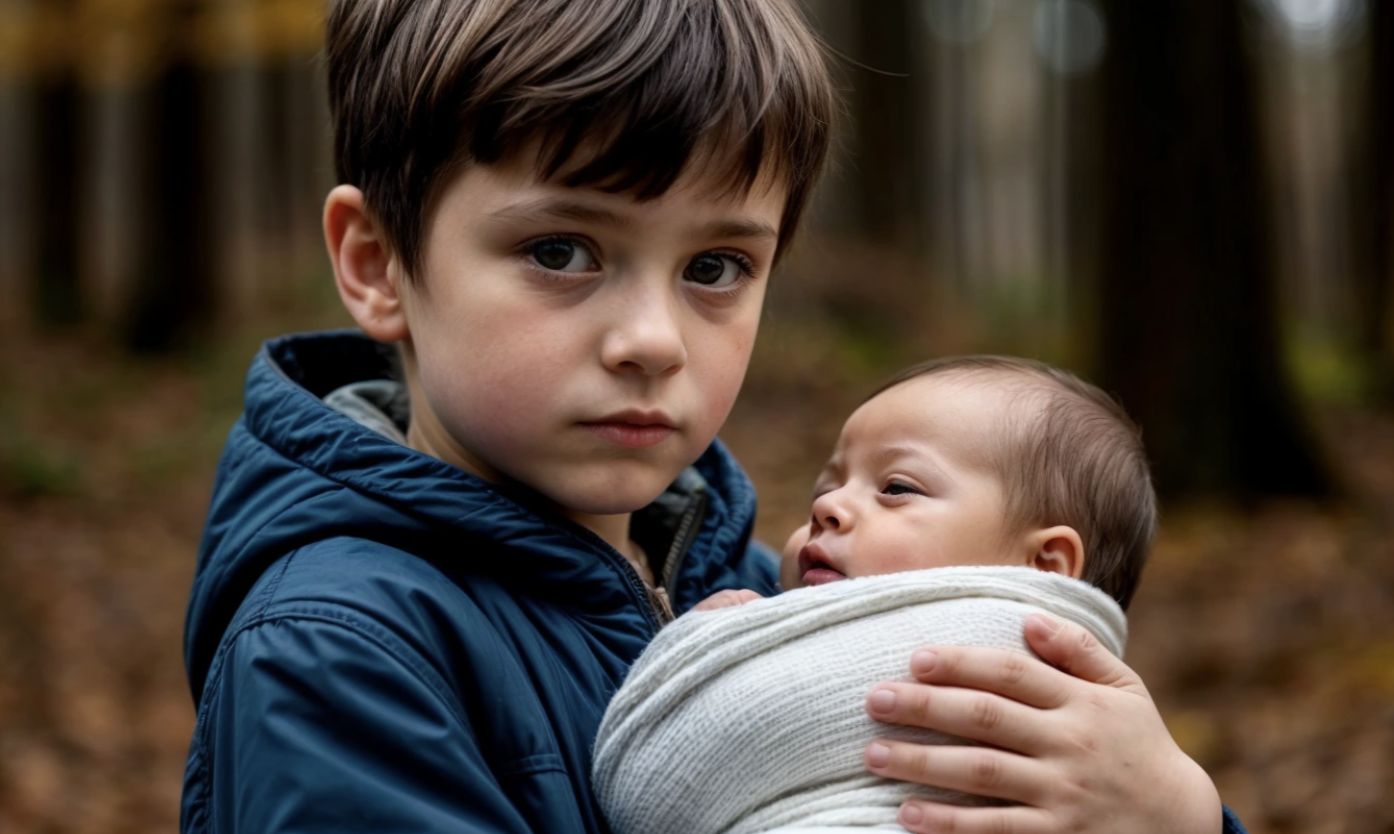Sitting on a bench outside the shop, I was mindlessly scrolling through my phone, paying no attention to the bustle around me. People hurried past—some talking on their phones, others simply going about their business. I would probably have stayed indifferent if I hadn’t heard a child’s voice—thin, weary, yet astonishingly serious.
“Auntie, do you maybe need a baby? Please take my little brother. He’s only five months old, and he’s really hungry…”
I looked up and saw a girl of about six or seven. She was skinny, swimming in an oversized jacket, her ponytail messy. Beside her stood an old stroller, from which came the soft breathing of an infant.
“Where’s your mom?” I asked gently.
“She’s tired… She’s been asleep for a long time. I feed my brother myself. We only have bread and water left…”
“And where do you live?”
The girl waved toward a shabby five-story block.
“Over there. We called Dad yesterday, but he said we have to manage somehow… He’s not coming…”
Something inside me coiled tight, like a spring. I wanted to scream, to cry, yet the girl stayed remarkably calm. For her little brother’s sake, she’d found the strength not to give up.
We set off together. I carried the baby while she walked beside me, glancing up anxiously as though afraid I might vanish like every other grown-up in her life.
The apartment was dark, damp, and cold. Toys were scattered in a corner; on the table lay a note: “Forgive me, children. I can’t go on. I hope kind people will find you.”
We called an ambulance right away, and soon the child-welfare officers arrived. But I couldn’t just leave. Six months later, Liza and Artyom became my foster children.
Now we have a home that smells of fresh pastries and rings with children’s laughter—where no one ever pleads, “Please take my brother—he’s hungry.”
Almost a year has passed. Artyom smiles, claps his hands whenever I come home. Sometimes he wakes at night and whimpers for no reason. I pick him up, hold him close, and he settles instantly.
Liza looks older than her years, yet now she’s happy. She has her own room, a favorite plush rabbit, and a newfound passion for pancakes. She used to burn them, but now she calls proudly:
“Mom, taste these—they’re banana, just like yours!”
The first “Mom” slipped out over a lunch of macaroni and cheese:
“Mom, pass the ketchup—”
She blushed. “Sorry… I know you’re not my real—”
I hugged her. “Real—because I love you. For real.”
Since then, she calls me that because she wants to.
We visit their mother’s grave. I don’t judge her. She broke. Perhaps, wherever she is, she’s glad I walked out of the shop that day and heard Liza.
Back then, Liza wasn’t asking only for her brother. She was looking for hope. I answered, “You’re needed. Both of you.”
Not long ago, Liza lost her first tooth. She held it out, shining in her palm.
“Mom, that means I’m grown-up now, right?”
I laughed through tears. Because now she can finally just be a child—wearing bear-print pajamas, tucking a note under her pillow: “Dear Tooth Fairy, the tooth is gone, but you can still leave a coin—no worries.”
Artyom has started to walk. His soft footsteps are music. Each time he looks at me as if to ask, “Are you still here?” I answer, “Always.”
We celebrated his first birthday—balloons, a candle, a cake. Liza baked cookies and wrote in a card:
“Happy birthday, Artyom. Now we all have a family.”
That evening she fell asleep on my shoulder—for the first time calm, unafraid—simply a child. My daughter.
In spring we planted flowers. Liza brought out a letter.
“Can I bury it? It’s for Mom—our first one.”
I nodded. She read aloud:
“Mom, I remember you. Sometimes I miss you. I’m not angry. We’re okay now. We have a mom who loves us. I’m almost grown-up. Everything will be fine. We haven’t forgotten you—just letting you go. With love, your Liza.”
She buried the letter, pressed the soil flat.
“Thank you for giving us life. Now let us go. We’re safe.”
Sometimes, to change someone’s fate, you only have to listen—and stay.
Now when the three of us walk down the street, people smile. They see an ordinary family—and they’re right. This is ordinary happiness: quiet, real, saving.
Two years have passed. Liza is in third grade. Artyom babbles his first phrases, singing “Mama.” And I am always here. And I will never leave.
